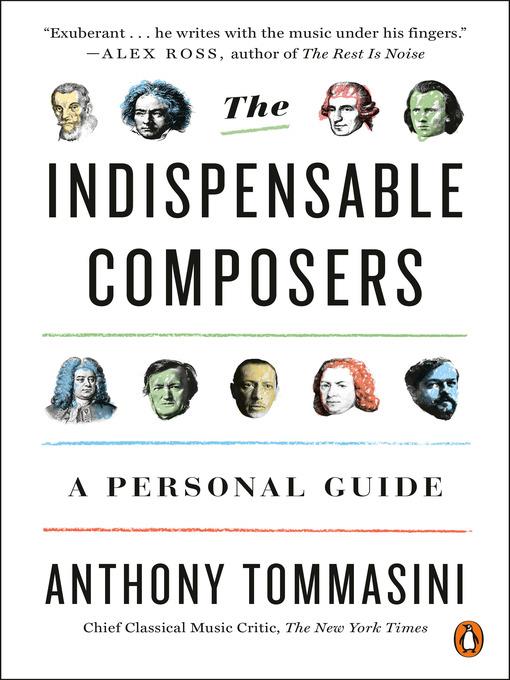
The Indispensable Composers
A Personal Guide
کتاب های مرتبط
- اطلاعات
- نقد و بررسی
- دیدگاه کاربران
نقد و بررسی

September 3, 2018
Seventeen classical composers are celebrated in these insightful critical essays. A concert pianist and New York Times classical music critic, Tommasini (Virgil Thompson: Composer in the Aisle) expands on a series of his newspaper articles to present a roster of favorites, including Renaissance pioneer Monteverdi; repertory pillars Bach, Beethoven, Haydn, Mozart, and Schubert; opera auteurs Verdi and Puccini; and the high modernist Schoenberg, whose atonal music he loves. Tommasini twines engaging biographical sketches of the maestros and their tragic ailments, love affairs, and endless scrambles for money with appreciations of masterpieces, the latter enriched by his memories of hearing and performing them. The portraits merge into a metanarrative about the emergence of the classical tonal language of comprehensible keys and lucid harmonies and its decay (or liberation) into unmoored dissonance. Tommasini’s interpretations sometimes overreach—he detects a “gay sensibility” (as have other critics) in the music of Schubert, because “seemingly happy passages contain disquieting subliminal elements”—but he excels at the difficult task of capturing music in words. “ gnarly, slow theme, like the grim song of a Slavic bass” with “hulking, weighty, strange intervals and chords” nails Chopin’s Prelude No. 2. The result is an engrossing study that will appeal to both classical music aficionados and novice listeners who want a road map. Agent: Andrew Wylie, the Wylie Agency.

September 1, 2018
A spirited musical compendium to the best of the best.New York Times chief classic music critic Tommasini (Opera: A Critic's Guide to the 100 Most Important Works and the Best Recordings, 2004, etc.) picks the "unfathomable achievements of indispensable--and indisputably great--composers." His goal is to keep his assessments simple, insightful, and jargon-free, and he succeeds. The author draws on biographical and historical materials, revealing anecdotes, and his extensive personal exposure to innumerable musical performances and skill as a pianist to provide succinct, highly readable miniprofiles of the greats. Entertaining, highly enthusiastic, and very knowledgeable, he's the perfect guide. Tommasini begins in the 16th century, with Monteverdi, the "creator of modern music," and ends in the 20th with a "modernist master," Bartók. The author is awestruck with the "staggering genius and superhuman achievement" of Bach's "innate musical talents of astonishing depth." For "all [of Handel's] genius as a musical dramatist," Tommasini suggests, he had his "show-biz side," and "reaching the public was crucial to his aesthetic." The author marvels that over a 75-year period, one city, Vienna, "fostered the work of four of the most titanic composers in music history": Haydn, Mozart, Beethoven, and Schubert, that "uncanny...hypersensitive outcast (a gay outcast?)." Recalling an "extraordinary" performance of Beethoven's Fourth Concerto, Tommasini can't help himself: "This is Beethoven! This is life!" If the author could go "backward in time to hear just one legendary composer in performance," it would be Chopin, "for sure." He encourages listeners to "see through the nastiness of Wagner the man to the beauty of his art." And "if there is one word that gets at the core of Brahms's music for me, it's breadth."Also starring Schumann, Verdi, Debussy, Puccini, Schoenberg, Stravinsky and, briefly, some up-and-comers like Philip Glass and George Benjamin, all exuberantly presented for your edification and enjoyment.
COPYRIGHT(2018) Kirkus Reviews, ALL RIGHTS RESERVED.

October 15, 2018
Tommasini is no stranger to music: at 16, he won a piano competition in Manhattan and went on to study music at Yale and Boston University, earning both a master of arts and a doctor of arts in music. In his role as the chief classical music critic for the New York Times, he is eminently qualified to share his expertise in what became known as the Top Ten Composer Project, the basis for this book. The first thing readers will notice is that there are more than ten composers here--in all classical genres--as the author was encouraged to say more about why composers were, or were not, chosen. This expanded list is a treasure trove of biographical information and a primer on the language and notation of music itself, and, yes, he explains terminology as he goes. VERDICT Tommasini makes a potentially dry and academic subject accessible. This is, of course, of special interest to musicologists and performers, but it will also appeal to listeners of classical music.--Virginia Johnson, John Curtis P.L., Hanover, MA
Copyright 2018 Library Journal, LLC Used with permission.

























دیدگاه کاربران